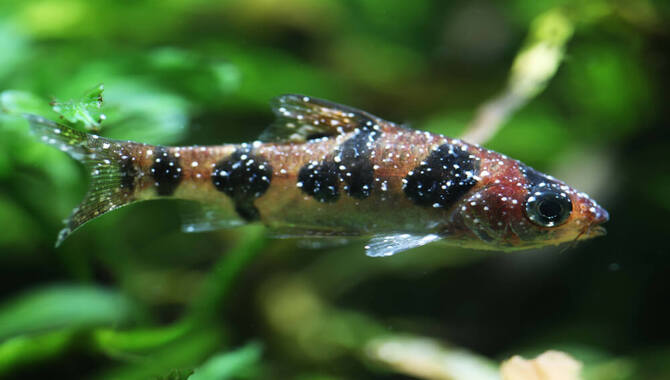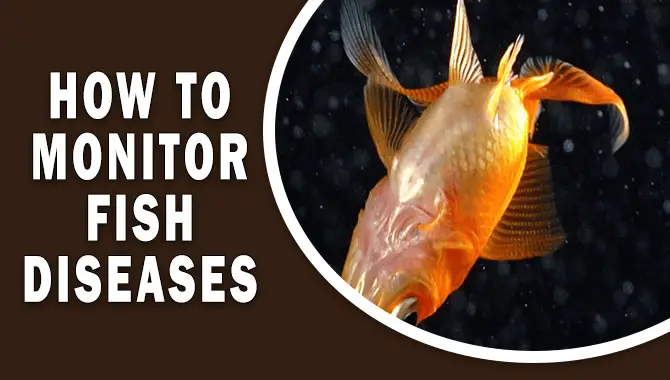As a fishkeeper, one of the most important aspects of maintaining a healthy aquarium or pond is ensuring the health and well-being of your fish. Regular fish health assessments are essential in detecting any potential health issues in your fish.
Which can ultimately save their lives. However, conducting a fish health assessment is not as simple as just observing your fish and looking for any physical abnormalities.
Multiple factors need to be taken into consideration, from water quality to fish behavior, in order to get an accurate assessment of your fish’s health. That’s why we’ve created this complete guide on how to conduct a fish health assessment.
We’ll cover everything you need to know, from the tools you’ll need to the specific steps you’ll need to follow to conduct a thorough assessment. We’ll also cover common health issues that fish face and provide tips on preventing and treating them.

How To Conduct A Fish Health Assessment – Expert Tips

Maintaining the good health of your fisheries management requires conducting an efficient fish health assessment periodically. You can follow the expert tips provided below to ensure that you conduct a thorough assessment. First and foremost, it’s important to notice any abnormalities in the number of fish behaviors, as this could indicate underlying health problems.
Next, ensure that all water quality parameters meet acceptable standards specific to your fishery requirements- A step necessary to ensure optimal growth rates of fish species in your fisheries management program. Here are some expert tips on how to conduct a fish health assessment:
Common Fish Diseases And Symptoms
Fish health is essential for any fishery or fisheries management, and conducting a proper assessment is crucial. Factors such as poor water quality, parasites, and stress can cause fish diseases. Identifying these diseases’ symptoms is also vital, including changes in color or appearance, physical abnormalities, and different behavioral patterns.
Knowing common fish diseases such as ich, fin rot, and swim bladder disorder is crucial. Early identification and treatment of these ailments can help prevent them from spreading to other fishes in the tank or pond.
Keeping detailed records of your observations can also help track changes in fish health over time. Regular monitoring of water quality can aid in preventing these ailments from occurring in the first place.
By conducting a comprehensive fish health assessment and meticulously following preventative measures for a fish health management plan, one could ensure healthy fish for an extended period.
Identifying And Isolating Sick Fish

Identifying and isolating sick fish is an important part of conduct a fish health assessment. The first step is to observe the number of fish’s behavior for any signs of abnormality. This helps with fisheries management and ensures that your fishery remains healthy and free from diseases.
While conducting a fish health assessment, look for physical symptoms such as discoloration, lesions, or unusual behavior. Once you have identified a sick fish, isolate it from the rest of the population to prevent the spread of the disease.
It’s always better to have a well-maintained and properly monitored fisheries management system to ensure that your fishes remain healthy and diseases don’t spread in your fishery.
Conducting Water Quality Tests
Maintaining proper water quality is crucial when it comes to conducting a fish health assessment. Testing for pH levels, temperature, dissolved oxygen, and ammonia levels is essential to ensure that the water is suitable for aquatic life.
Moreover, regular monitoring and testing of water quality can help identify the presence of harmful bacteria or parasites that can affect the health of the number of fish in your fisheries management plan.
Ensuring the water quality is maintained at optimal levels will create an ideal environment for your fishery. By conducting regular tests on your aquaculture facilities’ water supply chain. You can ensure that all parameters are within acceptable limits and create a healthy ecosystem for your aquatic life.
Assessing Feeding Habits And Nutrition
Maintaining your fishery’s optimal health requires conducting regular fish health assessments and assessing their feeding habits and nutrition. Observing the number of fish during feeding time can give you insight into their appetite and behavior. Which can indicate any potential health issues. Ensuring the fish receive a balanced diet catering to their nutritional needs is imperative.
Additionally, fisheries management experts suggest consulting with a veterinarian or fish health specialist who can provide valuable information on proper feeding practices. By adhering to these measures, you can maintain healthy fisheries while preventing outbreaks of common diseases.
Observing Behavioral Patterns
Observing behavioral patterns is critical for ensuring healthy fish continuation in the fisheries management system when conducting a Fish Health Assessment. Healthy fishes exhibit certain characteristics, like being active, alert, and responsive to their surroundings.
Conversely, lethargic or listless behavior may indicate an underlying health issue in fish under fisheries management. For instance, oxygen depletion or respiratory problems often cause fish to gasp for air at the surface of the water.
Hence keeping these observations noted and sharing them with experts can be beneficial while identifying potential health issues related to your fish in fisheries management systems like ponds or tanks.
Moreover, using best practices like avoiding sudden movements around tanks that startle fish and minimizing noise levels in their environment helps us make more precise observations about our fish’s behaviors.
Parasite Identification And Treatment
Parasites are a significant threat to the number of fish in fisheries management. They can cause severe harm to the overall health of fish. Thus, regular checks are vital to ensure that your fishery is healthy.
Parasites like protozoa, worms, and lice are common in fish. Visual inspections and microscopic analysis can help identify them quickly. Treatment for parasites will depend on their type and severity of infection.
Medicated baths or injections can be used for treatment purposes. Proper sanitation practices and quarantine protocols can significantly decrease the risk of parasite outbreaks in your fishery.
Preventative Measures For Fish Health

To ensure good health for your fish in an aquarium or pond. It’s crucial to take preventative measures, including regular testing and water quality maintenance.
You are quarantining new arrivals before adding them to an existing population, providing proper nutrition through a balanced diet with scheduled feedings, and observing behavior patterns frequently for early detection of illness or stress symptoms.
Managing fisheries to avoid overcrowding that leads to disease outbreaks. Additionally, practicing proper sanitation methods such as frequent water changes and filter cleaning will prevent harmful substance build-ups like ammonia and nitrite from harming your aquatic pets. Fisheries management can also help to prevent overcrowding and maintain the health of your fish population.
Creating A Fish Health Management Plan
Regular fish health assessment is crucial for maintaining a healthy fish population in your aquarium or pond. To create a comprehensive fish health management plan, assess the current health status of your fish population by observing their behavior and physical characteristics and monitoring water quality.
Based on your assessment results, develop a plan for addressing any health issues that arise while preventing future problems. Regularly monitoring and adjusting your management plan can help keep your fish healthy and thriving.
Fisheries management experts recommend conducting routine assessments to ensure the well-being of the number of fish present within the system.
Hiring A Professional Fish Health Consultant
When conducting a fish health assessment, hiring a professional fish health consultant with specialized knowledge and experience in fisheries management can help you achieve the best results.
A skilled consultant can guide you through complex or large-scale assessments and provide valuable insights into identifying potential health issues early on. When selecting a consultant, carefully considering their qualifications, experience, and reputation in the industry is critical.
To ensure that they’re the right fit for your needs, be clear about your expectations and goals for the assessment. By working together, you can develop effective strategies to manage potential issues before they spiral out of control.
Benefits Of Conducting A Fish Health Assessment
Conducting a fish health assessment can provide numerous benefits for fish farmers and aquaculture professionals. By regularly monitoring the health of your fish, you can quickly identify any potential health issues and take action to prevent the spread of disease or infection.
This can help to minimize losses and ensure the long-term viability of your operation. Additionally, conducting a fish health assessment can help you maintain compliance with local regulations and ensure your fish are safe for consumption.
Overall, investing in regular fish health assessments is an important step toward ensuring the success and sustainability of your aquaculture business.
How To Prepare For A Fish Health Assessment

Proper preparation before conducting a fish health assessment is crucial for obtaining accurate results. It involves gathering information about fish species and their typical health issues to detect problems early on.
Additionally, preparing equipment like nets and containers and selecting an appropriate location with proper lighting and water quality increases accuracy. Acclimating fish to the assessment environment should also be done before starting. Finally, a plan for handling any sick or injured fish detected during assessments ensures prompt action.
Successful fisheries management requires regular assessments of the number of fish within an ecosystem. Conducting such assessments can help maintain optimal water quality while reducing stress on fish populations. Hiring professional consultants can assist with complex or large-scale assessments ensuring valuable insights are gained regarding fisheries management.
Conclusion
Conducting a fish health assessment is crucial to ensure the well-being of your aquatic pets. It involves identifying and treating diseases and preventive measures to maintain fish health. Following a comprehensive guide, such as the one we have provided, can help you conduct an effective assessment and create a management plan for your fish.
Additionally, it can save you time, money and will give you peace of mind that your fish are healthy and happy. We have discussed on how to conduct a fish health assessment that helpful for you.
Always prioritize biosecurity measures, such as quarantining new fish and maintaining strict sanitation protocols. With proper monitoring and regular health assessments, you can maintain the health of your fish and promote the success of your aquaculture operation.
Frequently Asked Questions
How Do You Check The Health Of A Fish?
To check a fish’s health, observe its behavior, appetite, and physical appearance for signs of illness or stress. Check the gills for discoloration, mucus, or parasites, and inspect the scales and skin for lesions or abnormal growths. Test water quality to ensure it’s suitable for the species.
How Do You Perform A Fish Necropsy?
Performing a fish necropsy involves dissecting the internal organs to determine the cause of death. Carefully examining each organ for any abnormalities or signs of disease and taking samples for laboratory testing may be necessary. It’s important to record findings in detail for future reference.
What Is The Importance Of Knowing The Parts Of The Fish With Regard To The Quality Of Fish?
Understanding fish anatomy is crucial to assess the health and safety of fish. Certain parts, like gills and eyes, indicate contamination, while other areas may detect abnormalities. Regular assessments can help ensure high-quality fish for consumption.
What Is Fish Pathology?
Fish pathology is the field that focuses on identifying, diagnosing, and treating diseases that affect fish. It is crucial for maintaining the health of fish populations in both research and commercial settings. A comprehensive knowledge of fish pathology is necessary to assess fish health thoroughly.
What Are Some Common Signs Of Fish Health Problems?
Fish health problems can manifest as lethargy, loss of appetite, abnormal swimming, discoloration or lesions on the skin, difficulty breathing, bloating, swelling, and unusual growth. Regular observation is key to detecting issues early. Good water quality management and nutrition can prevent many common fish ailments.

Aquarium passion is all about connecting with the aquatic life and providing education to the public on the importance of these creatures. We showcase a wide variety of marine life through our exhibits as well as working with schools to provide unique learning opportunities for students of all ages.









